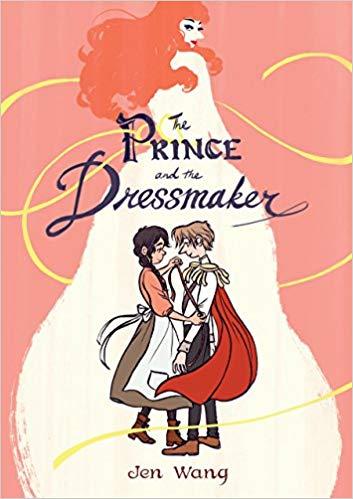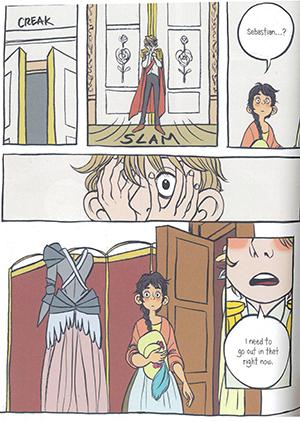Posted by Casey on Saturday, Nov 17, 2018
 The first of our Mock Caldecott selections up for review is Jen Wang's "The Prince and the Dressmaker". Set in Paris at the turn of the century, this graphic novel is part realistic fiction, part fairy tale and wholly delightful. Not only is the story exquisite, expanding on all of the wonderful fairy tale tropes with which audiences are familiar, but the visual storytelling is truly remarkable.
The first of our Mock Caldecott selections up for review is Jen Wang's "The Prince and the Dressmaker". Set in Paris at the turn of the century, this graphic novel is part realistic fiction, part fairy tale and wholly delightful. Not only is the story exquisite, expanding on all of the wonderful fairy tale tropes with which audiences are familiar, but the visual storytelling is truly remarkable.
Since we're focusing on the art, all I will say plot wise is that this is about a young prince, Sebastian, who enjoys dresses and whose parents are trying to find him a marriage match. He happens across an up an coming haute couture seamstress, Frances, who agrees to make dresses for him to wear in secret. Tensions arise as Frances tries to reconcile wanting to help Sebastian and keep his secret with wanting to further her career.

What really stands out to me about this graphic novel is Jen Wang's impeccable use of paneling and her incredibly dynamic and emotive style. She manages to draw the reader into the emotional world of her protagonists with ease and elegance.
Frances and Sebastian are consistently breaking the fourth wall, directly looking at readers and inviting them into intimate scenes. Wang also manages to use panels to indicate emotional states as well. When Sebastian first meets Frances there is a moment when we see him alone, isolated in a wide panel, his head in his hands. He looks trapped, imprisoned by his circumstances and by the panels. Then as we see things come to a head, Sebastian literally steps through the panels, eschewing the boundaries of the emotional turmoil and societal pressures by which he's been confined. The pacing for her paneling is masterful, often leaving characters bleeding out of panels at important and tense moments, allowing for the breath of the reader to fill the pause.

The wordless panels are numerous and particularly powerful. The things that are unsaid are just as weighty if not more so than those that are, and often things are left unresolved.
Everything about the way Wang has weaved all of the aspects of this story together makes her characters tangible and invites readers to not only empathize but to truly care for these two young people.
If you have not yet read this fantastic tale of romance, art, self-acceptance and beauty, I highly recommend you pick it up. And if you like it, be sure to vote for it in this year's ICPL Mock Caldecott. Voting starts on December 1st and will end on January 21st.


Emily Carroll's collection of horror stories is absolutely thrilling. -Casey